If your older dog is losing teeth, it’s usually an indicator of periodontal disease. Integrative veterinarian Dr. Julie Buzby shares the signs, symptoms, and treatment options for dental disease in older dogs. Learn how early intervention and preventative treatments can help your dog live a happy, healthy life.
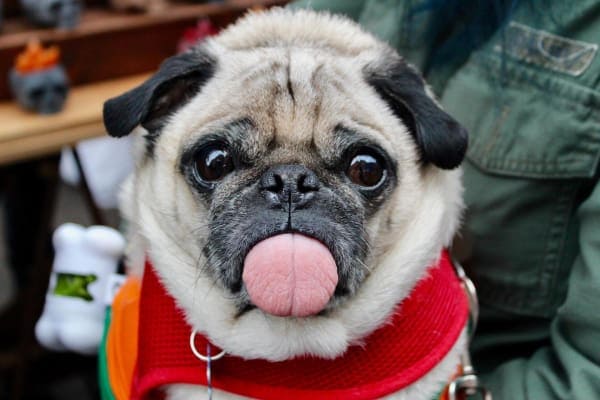
Did you know there is a connection between your dog’s oral health and their overall well-being? Awareness of the causes of tooth loss, the signs of early dental disease, and dental disease prevention and treatment options can help keep your senior dog healthy and comfortable when it comes to oral hygiene.
However, without regular dental exams, professional cleanings, and an awareness of the signs of dental disease, your senior pup could very well end up losing some of his or her teeth.
So what can you do today to prevent tooth loss in the future, and what options are available if your dear old dog has already lost a tooth or two? Let’s dive in.
Why is my older dog losing teeth?
If you’ve noticed your senior dog losing teeth and you can’t chalk it up to a traumatic injury, it’s quite possible your dog has some degree of periodontal disease (i.e. dental disease in dogs).
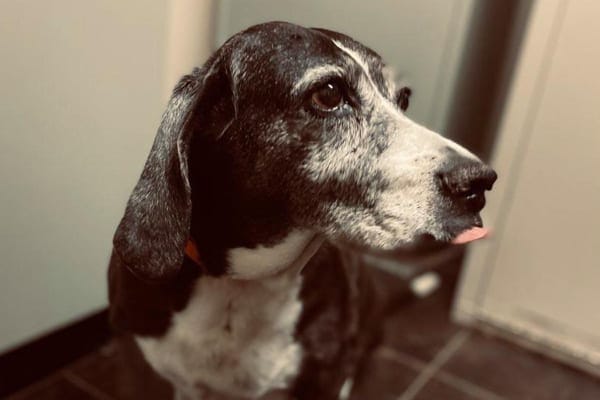
What is periodontal disease in dogs
Periodontal disease is inflammation or infection of the tissues around the dog’s teeth. These include the gums (or gingiva), the periodontal ligament that anchors the tooth in place, and the alveolar bone that surrounds the tooth roots.
Veterinarians diagnose periodontal disease very commonly. It is estimated that over 80% of adult dogs will develop some degree of periodontal disease by the time they are three years old.
This disease starts when plaque, a sticky substance made from saliva mixed with food particles, builds up on the teeth. Bacteria in the plaque can cause an inflamed gum line (i.e. gingivitis). This gum disease can progress to infect the alveolar bone surrounding the teeth.
Routine brushing can remove plaque from the teeth. But if not removed, plaque eventually hardens into tartar (i.e. calculus) over time. Brushing alone cannot remove tartar. It’s like cement on the teeth.
As tartar accumulates, inflammation increases and bone loss occurs. When alveolar bone loss exceeds 50%, teeth loosen and can fall out on their own.
The severity of periodontal disease may not be visible just by looking in a dog’s mouth. Dental X-rays under general anesthesia will help your veterinarian determine the stage of periodontal disease.
What are the stages of periodontal disease in dogs?
As defined by the American Animal Hospital Association, periodontal disease in dogs is staged based on how advanced it is and how much of the gums and alveolar bone are affected.
There are four stages:
| Stage 1 | Gingivitis and dental calculus; the alveolar bone is intact |
| Stage 2 | Early periodontal disease; <25% bone loss around the teeth |
| Stage 3 | Moderate to severe gingivitis; 25-50% alveolar bone loss |
| Stage 4 | Advanced periodontal disease with severe gingivitis and >50% bone loss |
What are the signs of periodontal disease in older dogs?
Catching periodontal disease early can save teeth from eventual loss or extraction. If you notice your dog displaying any of the following symptoms of dental disease, schedule a check-up with your veterinarian.
- Bad breath
- Pain when chewing
- Red or bleeding gums
- Dropping food or drooling when eating
- Chewing only on one side of the mouth
- Showing preference for soft foods or refusing to eat hard foods
The image below shows a senior dog with significant periodontal disease
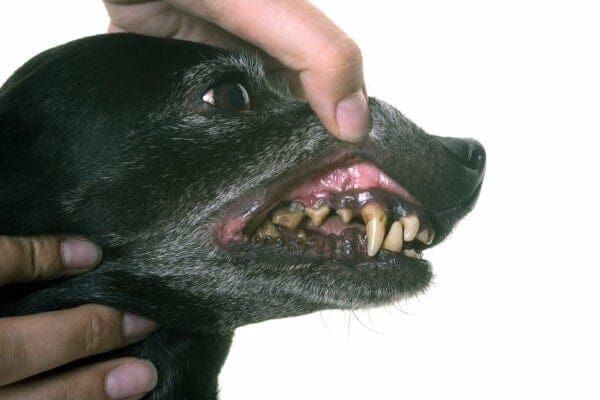
Signs of advanced stages of periodontal disease
If your dog is in the more advanced stages of periodontal disease, you may see the following:
- Pus around the teeth and gums (may be visible when you push on the gums)
- Visible thick tartar on the teeth
- Loose teeth or teeth that have fallen out
- Receding gums
- Swelling around the mouth or face because of tooth root abscesses (more common if your dog has a fractured tooth)
- Refusal to eat because of severe pain and oral sensitivity
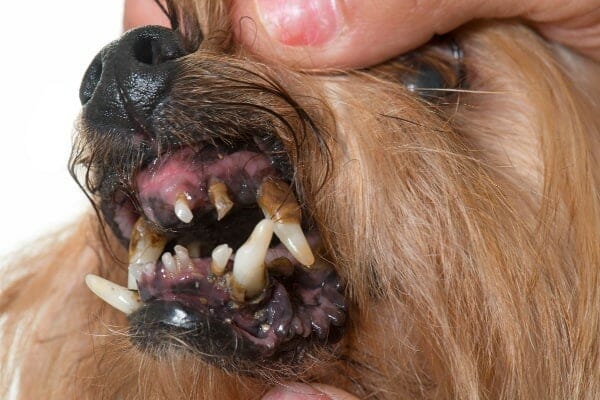
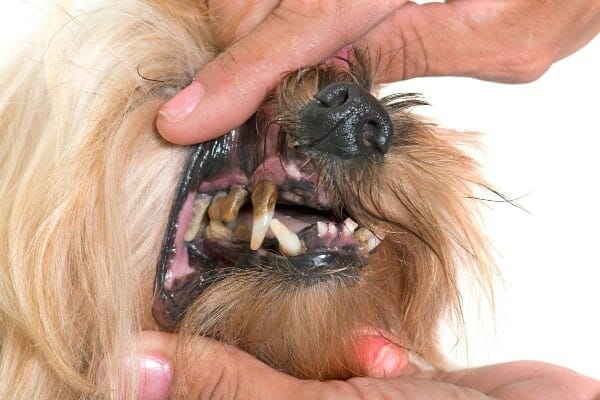
How does periodontal disease affect my dog’s health?
It may appear that your aging dog’s oral health is separate from the rest of her body, but nothing could be further from the truth. In fact, periodontal disease is one of the most common health problems diagnosed by veterinarians.
Here are three ways poor dental health can affect a dog’s overall health and well-being:
- Gradual weight loss: Because of the pain associated with periodontal disease, dogs often lose weight. If it hurts to eat, your dog will eat less and less.
- Lower quality of life: Dogs with dental disease may have less energy because their mouths may be a source of constant pain. This also means chronic inflammation, which is bad for mind and body. A painful dog may have no interest in playing with toys.
- Increased risk of heart disease: If your dog’s gums bleed due to gingivitis, bacteria from the mouth can enter her bloodstream and migrate to the heart. The bacteria attach to the heart valves, causing inflammation (i.e. endocarditis). In its early stages, endocarditis causes lethargy and weight loss. As it progresses, it leads to signs of heart failure such as:
- Coughing
- Difficulty breathing
- Exercise intolerance
- Sudden collapse
Is tooth loss normal for an older dog?
Let me be abundantly clear that if you’re wondering, “At what age do older dogs start losing teeth?” the answer is NEVER—at least not in an ideal world. Do older dogs lose their teeth? Yes, they do. I see it all the time in my veterinary practice. But, it’s not something we expect to happen in a healthy mouth. Tooth loss in dogs is not normal at any adult age.
In other words, unless suffering from a traumatic injury, it is not normal for an adult or aging dog to lose teeth. It is a sign of periodontal disease.
Take, for example, older people. Do you have an older parent or grandparent who is losing teeth? Maybe, but I’m guessing they are under the care of a dentist, endodontist, periodontist, oral surgeon, or some combination of these specialized doctors.
We do not treat tooth loss as a “routine” part of aging for senior citizens. It happens, but it indicates something is wrong. The same holds true for our dear old dogs.
How can I help my older dog who is losing teeth?
If you’ve noticed your dog is eating less due to dental pain, you can switch out any hard kibble for canned food, or even add warm water to soften his or her food. Anyone who’s ever had a toothache can tell you that sometimes hunger is preferable to eating something crunchy.
Although it may encourage them to eat, softening your dog’s food will not treat the underlying problem.
If your older dog is having a hard time eating or has lost any of their 42 teeth, a trip to the veterinarian is in order. By simply examining your dog’s mouth while she is awake, your vet can make some recommendations about how to proceed. He or she might suggest taking dental X-rays under general anesthesia to determine the periodontal disease stage and formulate a treatment plan.
A full dental cleaning under general anesthesia is the most common and effective treatment for periodontal disease.
What is involved in a routine dog dental cleaning?
During a dental prophylactic procedure, an ultrasonic scaler (just like those used by human dentists!) breaks up and removes plaque and tartar. After that, a polisher smooths the surface of the tooth making it harder for bacteria to adhere and form plaque in the future.
Sometimes a special gel is inserted below the gum line to help prevent future plaque and tartar from accumulating. These gels often contain an antibiotic to treat minor infections.
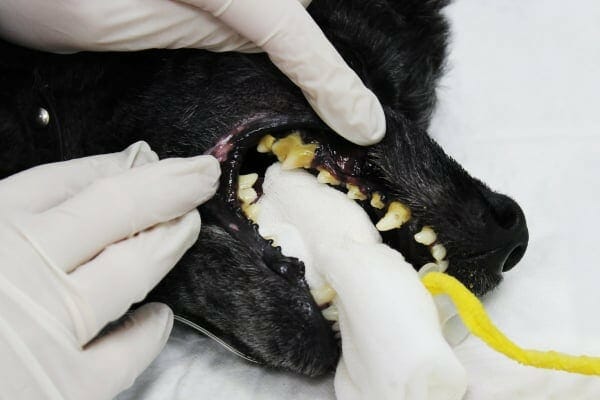
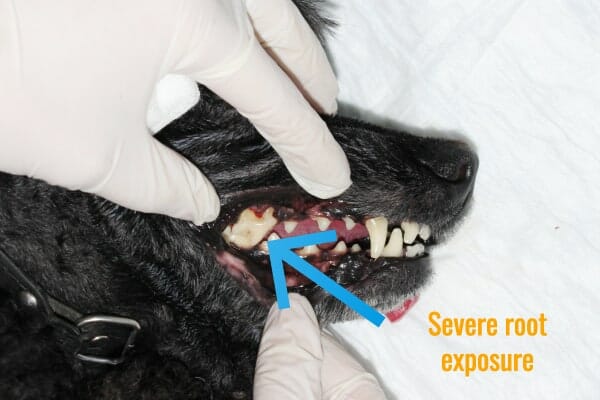
For the safety and comfort of your dog, X-rays and teeth cleanings should always be performed under general anesthesia. Non-anesthetic dental procedures simply cannot effectively treat or prevent periodontal disease. It’s extremely difficult, even in the best-behaved canine patients, to get dental X-rays without sedation. Also, cleanings won’t be as effective on an alert patient since the teeth can’t be cleaned or scaled below the gum line.
The “root” of the problem in periodontal disease lies with 60% of the tooth below the gum line. Thus, a dental procedure must be able to assess and treat the whole tooth, not just make the visible portion of the tooth look pearly white again.
What happens if diseased teeth are found?
In some cases, a board-certified veterinary dentist can save diseased or fractured teeth. Compared to general practice veterinarians, board-certified vets have a broader range of experience and procedures at their disposal such as a root canal, a vital pulpotomy, or crown restoration.
Most canine dental procedures are performed at the general practice level, and without specialized equipment and training, many of those advanced procedures are not possible. Teeth with significant alveolar bone loss typically require extraction. Even if those teeth are scaled and polished, advanced periodontal disease is not reversible, and the teeth are likely to become infected and painful for the dog.
Can I prevent periodontal disease in my dog?
In many cases, yes! Periodontal disease can be prevented with consistent dental care. Regular tooth brushing is one huge step in the right direction.
Tooth brushing removes food particles and bacteria before they turn into plaque. Keep in mind it only takes a few days for plaque and tartar to form, so daily brushing is ideal!
If you’ve never brushed your dog’s teeth before, there may be a bit of a learning curve for your dog and for you. Take it slowly, and stick with it! Use a soft-bristled toothbrush and toothpaste designed for dogs since human toothpaste can be harmful to dogs if swallowed. I recommend C.E.T. brand toothbrushes and toothpaste to my clients.
For a video tutorial and step-by-step instructions, please check out my article: Should I Brush My Dog’s Teeth? 7 Toothbrushing Tips.
Other dental products for dogs
You may also want to consider other doggie dental products in addition to toothbrushes and doggie toothpaste. Dental chews can help physically remove food particles. Some even have a special coating to prevent bacteria from sticking to your dog’s teeth. Water additives, oral hygiene rinses, and therapeutic veterinary diets can also be beneficial for dogs who are prone to dental disease.
For the most effective products, look for the distinctive white logo of the Veterinary Oral Health Council, or see their current list of accepted dental products for dogs. Any product with this seal of approval has gone through two clinical trials to demonstrate its efficacy, so you can feel confident it will delay plaque and tartar formation.
In addition to brushing your dog’s teeth at home and choosing effective dental products for dogs, you can also look no further than your dog’s toy box and only choose safe chew toys for dogs.
Preserve the smile you love
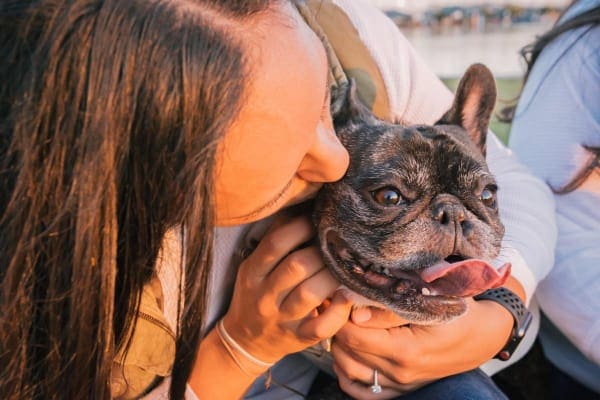
Periodontal disease at any stage is serious, and if left untreated, can lead to tooth loss, difficulty eating, weight loss, and even heart disease. However, the sooner you notice early warning signs, the more likely you are to preserve that happy smile you’ve come to love over the years.
Of course, if your dog is already losing teeth, contact your veterinarian right away. With quick intervention, you can relieve your pup’s discomfort in no time.

What habits do you have for keeping your dog’s teeth and gums clean?
Please comment below.


my pomeranian is 11 years old. we rescude her from a bad situation at the age of two and has always had bad teeth no matter what we do. she had 10 teeth pulled a couple of years ago. she needs more dental work done and is in alot of pain. but the work she needs done will cost us $4,000. my husband doesn’t want to pay that with her age. but it’s breaking my heart how much she is hurting. Would it be more humane to just have her put to sleep then let her live in pain. I know toothpane and infections hurt I’ve had one before and she has about 6 more teeth that need to come out and have it. I’m just not sure what to do.
Dear Jamie,
My heart goes out you to as you face this emotional situation with your senior girl. I understand how finances can sometimes limit our choices and I am sorry you are in this difficult position. It is ok to choose palliative care and forgo expensive procedures, but it is not humane to leave your girl living with uncontrolled pain. If your vet can offer medications to keep her comfortable it can be ok to give this more time. But if there is no solution for the pain, it would be better to offer relief and peace and say goodbye. Praying for clarity and strength as you navigate this tough path. Bless you and your sweet girl. ♥
my dog 8 yr old m from uttrakhand in India here vertinary are not good for dental cleaning my dog suffer peridentonl diease what can I do
Dear Beauty,
I understand your concern for your dog with the dental issues they are facing. I am sorry you don’t’ have access to the care your pup needs. I am not sure there is a good solution to this problem. The only thing you can do is see if your vet is willing to prescribe some antibiotics if an infection is present. Dental care at home is also very important. If your dog will let you brush their teeth or even wipe the teeth with a cloth each day, it could help slow the progression of the dental disease. Wishing you all the best of luck. Take care!
Hi,
I have a 5 year old French bulldog. I think there are two issues happening simultaneously but she has started itching so badly for the last week or so and she’s loosing fur and making her skin bleed. Tonight ive noticed one of her teeth on the sofa and it breaks my heart. I’ve been adding supplements that claim to help her skin and allergy’s but so far no good. I’m planning to call the vets in the morning but I’m so worried, she isn’t very nice at the vets and they’re going to have to sedate her to look – if they have to then clean her teeth I don’t want to put her through going under again due to stress and her breed.
If there’s anything else I could be doing to help her any advise is appreciate I just feel so bad for her.
Hi Chelsea,
I understand your concern for your pup and agree this is a very difficult situation. It is hard to offer specific advice without being able to personally examine your girl. I think a visit to your vet is the best way to go. Hopefully they can get some answers and help you find the best way to restore your girl’s health and quality of life. Praying for healing and a clear path forward.
Hi. I have a 7 year old Shih Tzu and only during lockdown since I’m not home always before, did I see that he has severe teeth disease. All of his teeth have now fallen (3 left). He can still eat but I worry about the pain and I also worry taking him to vet to remove the remaining teeth because he is small, can he take anesthetic procedure due to his size? Can he still take this dental procedures even if there is also a possibility of bacterial infection due to the teeth disease? I also heard vet dental services are very expensive that is why it is uncommon in our place. I do bought him cleansing sprays and I use dog teeth wipes to clean his mouth. I hope I can atleast help him that way. Thank you for posting this. I’ts given me more understanding of his problem.
Hi Anna,
I understand your concern for your little pup as he is experiencing severe dental disease. Size is definitely not something that will prevent your vet from performing anesthesia and a dental cleaning. In fact, smaller dogs use less materials and require less medication so this may help to keep the cost at a minimum. The presence of a bacterial infection is the main reason to proceed with a dental procedure. Removing the diseased teeth and cleaning the bacteria out from under the gumline may be the only way to resolve the infection. It is important to have pre-anesthetic blood work checked to make sure your dog’s internal organs are functioning properly. If there are abnormalities on his lab work, this would be a reason to forgo anesthesia and potentially cancel the dental procedure. I encourage you to discuss your concerns with your vet and ask any questions you may have. They can help offer advice and guide you in this difficult decision-making process. Wishing you and your sweet boy all the best. Take care!
My dog is is a 17 year old miniature/toy poodle. I was told by her vet she had Tartar and plaque on her teeth however because of her age and health issues she can not have anesthesia and have a teeth cleaning in the office. So I bought an ultrasonic dental scaler so I can clean my dogs teeth myself. I noticed when I used it she has several rotten and loose teeth so I am assuming I should contact her vet.
She is deaf, blind, and has to wear diapers (because she is incontinent in her sleep). She seems happy though and loves my husband. She looks forward to him coming home. She senses him.
Hi Christy,
I am sorry your senior girl is having issues with dental disease. While I commend you for taking action and trying to improve your dog’s oral health, I would offer a word of caution on performing a dental cleaning at home. The dental scaler can actually cause microscopic damage to the tooth enamel if not operated in just the right way. So, there is a risk of making defects in the teeth that can speed up the formation of plaque and dental issues in the future. Also, the reason we sedate animals when cleaning teeth, is it is vital that the plaque be removed from below the gumline around the periodontal ligament (this is the plaque that ultimately leads to tooth loss). This cannot be achieved while a dog is awake. I agree, if you are noticing loose or rotten teeth then you need to contact your vet. Due to your senior girl’s situation, I would recommend you talk to your vet about a referral to a dentistry specialist. Most specialty hospitals have board certified anesthesiologists to monitor dog’s during the procedure and they are trained to handle more complicated cases, making anesthesia less risky. I hope you can find the best way to ensure your girl remains happy and healthy for as long as possible. Wishing you all the best and take care!
I have a 16 year old Yorkie that I inherited. He has severe dental disease. Breath is horrible. Vet says we need to check his blood work a second time for clarity and possibly they can clean up his mouth but possibly not due to blood work results. He will not eat for two days now. Drinks water but throws up. Wobbling when trying to walk. Still urinating. It is so sad to watch. What does end of life look like in dogs with severe periodontal disease? Thank you.
Dear Sandy,
I am so sorry your Yorkie is dealing with such severe dental issues. While dental disease can be very painful, it is usually not life threatening unless there is uncontrolled infection, or it has affected the internal organs. With the symptoms you have described, I am very concerned that there are other problems contributing to your girl’s condition. I think blood work would be a very good idea. Without examining your girl myself, it is hard to make specific conclusions, but I would want to rule out the possibility of kidney failure or other organ dysfunction. Hoping you can get some answers quickly and find the best way to restore your dog’s quality of life. Wishing you all the best and praying for a positive outcome.
Hi I have a 15 year old Yorkie we had blood work done last month and everything came back normal. But she does have gingivitis but because of her age and size the vet said it’s not best to put her under to have her teeth extracted. I just noticed yesterday that her bottom canine tooth is sticking out sideways out of her mouth and seems to be licking a lot. She’s still eating but should I let it fall out on its own? Or take her to the vet??
Hi Vivian,
I am sorry your senior girl is having dental issues. I definitely think it would be best to have your vet take a look at the tooth. Your pup may need something for pain or there could be an infection that needs to be treated. Also, while your girl may not be a good anesthesia candidate, I do not consider age and size to be risk factors by themselves. As long as the necessary pre-operative testing is performed and the results are favorable, I would recommend moving forward with a dental cleaning and then assess the need for extractions. You can always request a referral to a dentistry specialist if needed. Specialists are sometimes more comfortable with taking on senior patients or those with more challenging issues. Hoping you can get your sweet girl the care she needs. Best of luck to you both!
Hi, I see many postings about senior Yorkies. My baby boy who is 17 years old has a bad gum/tooth infection which has turned into an abscess on his upper right side cheek. I’ve been treating it with saline warm compress. I haven’t taken to the vet because he has health issues which I was told years ago he could not be given anesthesia. I feel helpless! My baby eats, walks, and goes outside like a puppy, just for this abscess which looks awful. It has burst occasionally! Now, I can hear and see his jaw shaking and like he grinds it to make it feel or shifts it. Please what is this? I want to take to vet, but I do t want them to tell me to put him down! I just can’t he is well other wise and doesn’t cry or sleep all day. He still acts like a senior puppy lol… Help me, I’ve been praying for a miracle for my sweet baby boy Bambam! 🙏🏼🌟❤️
Hi Maria,
I am sorry Bambam is suffering with a painful tooth abscess. The shaking jaw and teeth grinding are all displays of pain and discomfort. I understand your concern for his well-being especially if he is a high anesthesia risk. But unfortunately, in this situation you don’t have many options. Your vet may be able to offer antibiotics as a kind of palliative care, but at some point, the infection will take over and you will have to make the choice to say goodbye, or your boy may pass and leave you without the option of offering a peaceful goodbye. I strongly encourage you to reach out to your vet. Give them the chance to evaluate the situation and go over your options. I hope you can find the answers you need to make the best choice for everyone involved. Praying for comfort and peace.
hi there,
I have 12 year old Shipoo. I when to a doctor that focus only on dental issues for dogs. due to the exams they told me they were unable to treat him at this moment until his results get better. Chico, my dog is my everything and I want to be able to help him in the best way I can, he does put up a small fight when trying to brush his teeth so I admit, I didn’t brush his teeth as much as I should have throughout the years. (thus the reason why they worsen over time). After the exams I’ve been more active even if he puts up a fight to brush his teeth as softly as possible, and also applying a small gel before going to bed. He is pretty active, and doesn’t seem to have any pain when eats his food. Because of kidneys and liver he does have to eat special food and medicine which is helping him a lot getting his levels on track for a proper removal of the 2 most effect teeth. In terms of energy he has his moments, sometimes good days, sometimes lower energy, it worries me a lot, again this little guy is my best friend and my everything, its always been me and him. I’m worried that before the vet can properly remove his 2 decaed teeth, that they fall on their own and he eats them somehow ( their his back teeth) and somehow affect his digestive system. hopefully this won’t be the case but I want too be able to help him in the best way possible in case it does.
Dear Luey,
I am sorry Chico is having dental issues and is not a good candidate for anesthesia at this time. It is hard when you want to do what is best for your pup but are limited due to circumstances that are out of your control. I would not be concerned about Chico eating his teeth. Most dogs swallow a fair amount of their baby teeth when in puppyhood and even the adult molars are not large enough to cause an issue going through the digestive tract. I understand that these teeth are decayed but the infection is already in your dog’s mouth, so this would not be a “new” issue for your dog’s GI tract. You may want to talk with your vet about trying a course of antibiotics just to see if it can keep the dental disease under control as you work on improving Chico’s liver and kidney function. Wishing you all the best and praying for healing for your sweet boy.
How do I help my 16 yr dog , he has teeth that are falling out right now he has like 3 teeth that just hanging on , should I pull them out or just let them fall out on their own
Hi Michele,
I do not recommend you pull the teeth as this could be painful for your pup (even if they seem to be barely hanging on). Your best course of action is to have your dog examined by your vet. They can help you make a plan for how to proceed and ensure your sweet boy is well taken care of.
How much pain is associated with periodontal disease and losing if back teeth is my silky terrier experiencing
What is most affective for pain
Hi Blanche,
It is hard to put a number to the pain felt by another person or animal. I think about how it feels when we as humans have a tooth issue and how badly it can hurt. The pain we feel when we have an infected tooth that is starting to fall out should be the same pain a dog feels in a similar situation. Dental pain can be severe and instead of using a pain medication it is recommended to treat and resolve the underlying issue if at all possible.
Hi, I have a 13 year old patterdale terrier, he is a rescue and is quite reserved about letting you near his mouth, I do try to brush his teeth but have failed to keep this as regular as I should have, he has daily dental chews but this morning his whole (not snapped) right canine tooth was on the floor, no blood or anything like that, i did manage to check his gums and they do look quite pink where the tooth was but again no blood or anything that I could see. I couldn’t get him in at the vets today so am taking him tomorrow but I’m just so worried and really need some advice.
Hi Jade,
I’m sure that must have been quite a shock to see his canine tooth on the floor. Hopefully the vet visit gave you some answers and a clear plan going forward. Feel free to give us an update on how he is doing now!
I have been told that my 17 year old shih-tzu’s liver enzyme levels make it so he is no longer a candidate for anesthesia and teeth cleaning. He also has some heart issues. Yet the vet’s always also comment on how well he is doing overall and how surprised they are to find that he is 17. My experience of him as well is one of a good quality of life; he moves well, eats well, has regular and healthy bowels etc… but he does lay/sleep a lot and occasionally has very brief and sporadic bouts of coughing or panting that I’ve assumed are related to his heart, and I suppose I figured that was/is normal for him being 17 years old.. Anyways, he does have stage 3 almost 4 periodontal disease at this point since his last cleaning was about 2 years ago and he fights so hard when I try to brush his teeth that the best I’ve been able to do regularly is use dental wipes to mostly get extra food/debris out of his cheek pockets/gums. Water additives and sprays (which he also won’t stay still for so I’m unsure if I’m really getting enough on the right places to be helpful) don’t seem to help. Just the other day I noticed a loose tooth and it must’ve fallen out or he swallowed it yesterday and once it was gone and I had a better view of the area, I noticed what looks like two black gum areas where teeth used to be. I contacted his regular vet (which is at a Banfield clinic) who urged me to go to an emergency clinic instead. I feel horrible to admit this reality, but after losing everything in a wildfire a couple years ago, COVID and some other hardships, we just really can’t afford an emergency vet visit or much of any intensive treatment that may be needed after the visit except maybe paying for a standard visit and antibiotics. So I am sitting here knowing that I can’t afford to take him to the ER today, was able to squeeze us in to an appointment at Banfield for tomorrow morning, but they told us because they are a preventative care clinic that they may not even be able to help and would probably end up referring us to an emergency clinic anyways. But at this time he is still eating just fine (he’s actually seemed even more demanding and eager for food actually), the gums are black but I do not see any white and his breath might be a little stinkier than usual but he is not displaying any other noticeable symptoms. I understand dogs mask pain well/have a high pain tolerance and no way to really express the level of discomfort they are feeling. And after having Rusty for all 17 years of his life, I have also developed quite an ability to receive “communications” from him with just a look. (He “told” me about a tick just by looking at me, no whining, biting, itching etc…just a look. Same thing with a few injuries he had and there are other examples but you get the point. And I am very observant of his personality and behavior.) I guess I am here asking if you know of anything else I could be doing under my specific and financial circumstances besides what I’ve already done? I am also fine hearing that there may not be anything else that can be done if he is unable to go under anesthesia. I want the end of his life to be as comfortable and honoring as our 17 years together have been up to this point. And if the reality is that I can no longer afford to provide what he needs and it is highly likely that he is indeed suffering greatly and the most humane and loving thing I can ultimately do at this time is put him down, though of course my heart hurts at the thought and I’d prefer an alternative, I am ok with hearing that this choice might actually be what’s best for him. I know this is a personal and difficult decision and you may not feel comfortable and that it may be even legally ill-advised for you to comment on this. So whatever you feel comfortable responding with and if you have any other insights I might be missing, I would deeply appreciate receiving them. Thank you for your time and consideration.
Hi Malen,
I understand your concern for Rusty and these new dental issues that have surfaced. I agree that something needs to be done, but I don’t think what you are describing sounds like a case for the emergency clinic. Since I haven’t examined Rusty myself, it is hard to know the severity of his oral problems. You mentioned your regular clinic only practices preventive care. In this case, I think it would be best to find another clinic to have Rusty established as a patient. There should be other clinics in your area that offer full services and can provide what you need as a general practice veterinary hospital. Your vet may indeed agree that due to his preexisting conditions, your pup may not be a good anesthesia candidate. They may offer to do antibiotic therapy as needed on an ongoing basis. It is also a great idea to discuss your concerns about Rusty’s quality of life and see if they can offer hospice/palliative care when the time comes. It is obvious from your words just how much you love your senior guy. I think you are doing an amazing job advocating for his health and wellbeing. Keep up the good work and give your sweet boy a hug for me. ♥
My 14-year-old cocker spaniel had a swollen jaw so I took him to the vet, she said it’s mostly likely plaque that is bothering him and prescribed antibiotics and painkillers which worked very well. Yesterday the dog spat out a molar with a lot of plaque. I was amazed at how well the surfaces of the tooth still looked after all these years. He is very lively and is eating well. I would likely also opt for antibiotic treatment and painkillers again if the problem recurs. They do work and are not expensive.
Hi Ingrid,
I am glad your pup seems to be doing better after staring antibiotics and pain killers. I know you are happy with the outcome, but I am still concerned about the loss of your dog’s teeth. If dental disease is resolved, then tooth loss should also have been prevented. I know a dental cleaning/procedure is not possible for all dogs as certain health issues can make them a poor anesthesia candidate. With that being said, I recommend you talk to your vet to see if your pup could benefit from dental x-rays or a thorough dental assessment and cleaning.
Hi, I’m Maritza, I have a yorkie,she’s 11 year’s old,just noticed that her front teeth’s R very loose,about to fall out, lot’s of tartar,like U I can’t afford to even take her to the vet right now, I noticed her breath was very stinky,so I bought her a gel,but I started to cry because I got so so sad my baby needs medical help,and I can’t afford it, I don’t know what to do,it’s just her And I,I’m sorry for UR situation, I will pray for R pet’s N for a solution to come our way.
Hi Maritza,
I am so sorry you are in this difficult situation with your yorkie. Praying you will be able to find a way to get your pup the help she needs. ♥
My 9 year old rescue chi teeth are falling out naturally all of the time.. We are so scared to put her under anesthesia. She seems in good spirits and loves to go for walks and loves to eat. Can they just fall out naturally? What are they the negative effects on her is we don’t do the extractions.?
Hi NL,
I understand your concern about anesthesia and your senior pup. There is lab work and testing that can be done prior to anesthesia to make sure your girl is a good candidate for her dental procedure. Age alone should not be a determining factor whether to undergo anesthesia or not. I will attach links to other articles that may offer additional information. Dental disease and subsequent loss of tooth attachments can be extremely painful. Dogs are great at hiding exactly how much pain they are feeling. Loosing teeth is not a natural process and should always be addressed if medically possible. If the dental disease is not resolved, it could lead to bone issues in the jaw, infection, damage to internal organs, etc. I hope you can find the answers you need to make the best decision for you and your little girl. Best wishes and good luck!
1. Is My Dog Too Old For Anesthesia?
2. Is My Dog Too Old for Surgery?
3. How to Recognize a Dog Tooth Abscess and What to Do About It
Hi I rescued a bluetick beagle. He had mange really bad. Took to.vet. now his coat is shiny, very active and great all around dog. But his front small teeth are rotted out to the gum. Now I live on social security alone. Don’t have money to get dental work done. Vet said it would be very expensive. Are there any programs that will do that?
Hi Helen,
I am sorry you are in a tough situation with your beagle pup. I understand how difficult it must be to want the best for your dog but feel like it is just out of reach. I am not aware of any specific programs that offer low-cost dental procedures. You could try contacting your local humane society or beagle/hound rescue groups in your area. They may have financial assistance for cases like this or have contact information for other organizations that might be able to help. Also, you can call different vets in your area to see if they have different prices for dental procedures. I hope you can find the help you need to take care of your sweet boy. Good luck!
Hi,
My dog will be 7 in January. Her front tooth has come out including the root. Her exposed tooth was white but when it gets to the root its seems to be covered in black hard substance. Do you think it’s Periodontal disease?
I do brush her teeth everyday since I noticed she had tar build up and she has dentastixs. She is still eating her food and she isn’t in pain. I’m very confused.
Hi Michaela,
I am glad your girl allows you to brush her teeth daily and the dentastix are a good option as well. Without seeing the tooth myself, it’s hard to say for sure what the exact issue was. Since the root was black, it makes me think it could have been damaged or injured causing the root to die. Sometimes plaque can get below the gumline and around the socket of the tooth even if the crown looks clean. My advice is to talk to your vet about this strange tooth development. They may want to do a good oral exam or discuss dental x-rays to ensure there are no bone issues with the jaw and teeth. I hope this was a one-time event and your girl won’t have any issues moving forward. Keep us updated!
My 11 year old dogs teeth are starting to fall out. I called my vet to book in a teeth clean but as they want over £300 to do it, they will just have to fall.
I do his teeth with the electric toothbrush which he allows and give him denta sticks and raw hide sticks.
Any other suggestions?
Hi Nat,
I understand your concern for your senior dog and his loss of teeth. You are doing a great job with brushing and the dental treats. There may be a water additive or oral rinse/spray that could help to keep the dental disease at a minimum. Unfortunately, once dental disease has reached an advanced stage, there may be no treatment options available other than a complete cleaning and extractions. Also, it is possible the tooth loss is due to a bone problem with the jaw. This cannot be readily assessed without anesthesia and maybe x-rays. If there is any way you can raise the funds to have the dental procedure done, I think this would be in your dog’s best interest. Dental disease can be extremely painful and can shorten a dog’s lifespan. I am hopeful you can find the best way to keep your senior guy living his best life. Wishing you both the best for a happy future.
My 12 lb Half poodle and half chawauwa is starting to Lois teeth I found a miler and a front tooth. Last examine she needed to b muscled so dental cam is extremely difficult. Her breath is terrible She’s 10 11 human yrs. Active. But I know her gums are not good. She would never allow me to brush her teeth. So the groomer offered a mint gel that is supposed to help her teeth and breath. Is there anything else I can purchase for her without. The high cost of dental procedures. I am a caring and thoughtful dog owner just not Rich. Thank u for any help. Ranzalotti@ yahoo.com. Thank u again. Ruff ruff.
Hi Robert,
There are many different dental products (chews, rinses, water additives, etc.) that help prevent tartar build up. Unfortunately, once you have advanced dental disease, a dental cleaning with possible extractions is really the only way to relieve the discomfort and stop progression of the disease. I understand how worrying it can be to have the desire to help your sweet girl but feel like your hands are tied due to cost. I recommend you talk to your vet and discuss your concerns. They may be able to give you a rough estimate of what the dental procedure may cost which would allow you to start saving and budgeting for it sometime in the future. Also, some clinics offer payment plans or care credit as an option. Praying you can figure out the best way to help your senior girl. Best wishes to you both.
My 12yo dogs 2very front teeth are loose and not from periodontal disease but rather rawhide bone chewing. No inflammation at site. Will they fall out on their own? Thx.
Hi Jamie,
Sorry to hear that your pup has some loose teeth. While they might fall out on their own eventually, I would recommend having your dog’s teeth evaluated by your vet sooner rather than later. Loose teeth can be painful or allow infection and bone loss to occur below the surface of the gums where you can’t see it.
Can you just pul loose teeth?l
Hi Julie,
I wasn’t sure if you meant, “Can the vet pull loose teeth?” or “Can the dog parent pull loose teeth?” so I’ll answer it both ways to ensure you get the answer you are looking for. Your veterinarian can safely extract loose teeth while your dog is anesthetized for a dental procedure. This prevents your dog from feeling pain or distress while the tooth is removed and allows the vet to pull the tooth in a controlled method using specialized equipment to further loosen the tooth if needed. However, I would not recommend trying to pull your dog’s loose teeth at home. This could be painful for your dog, lead to a jaw fracture, or cause injury to you if your dog accidently bites down on your fingers.